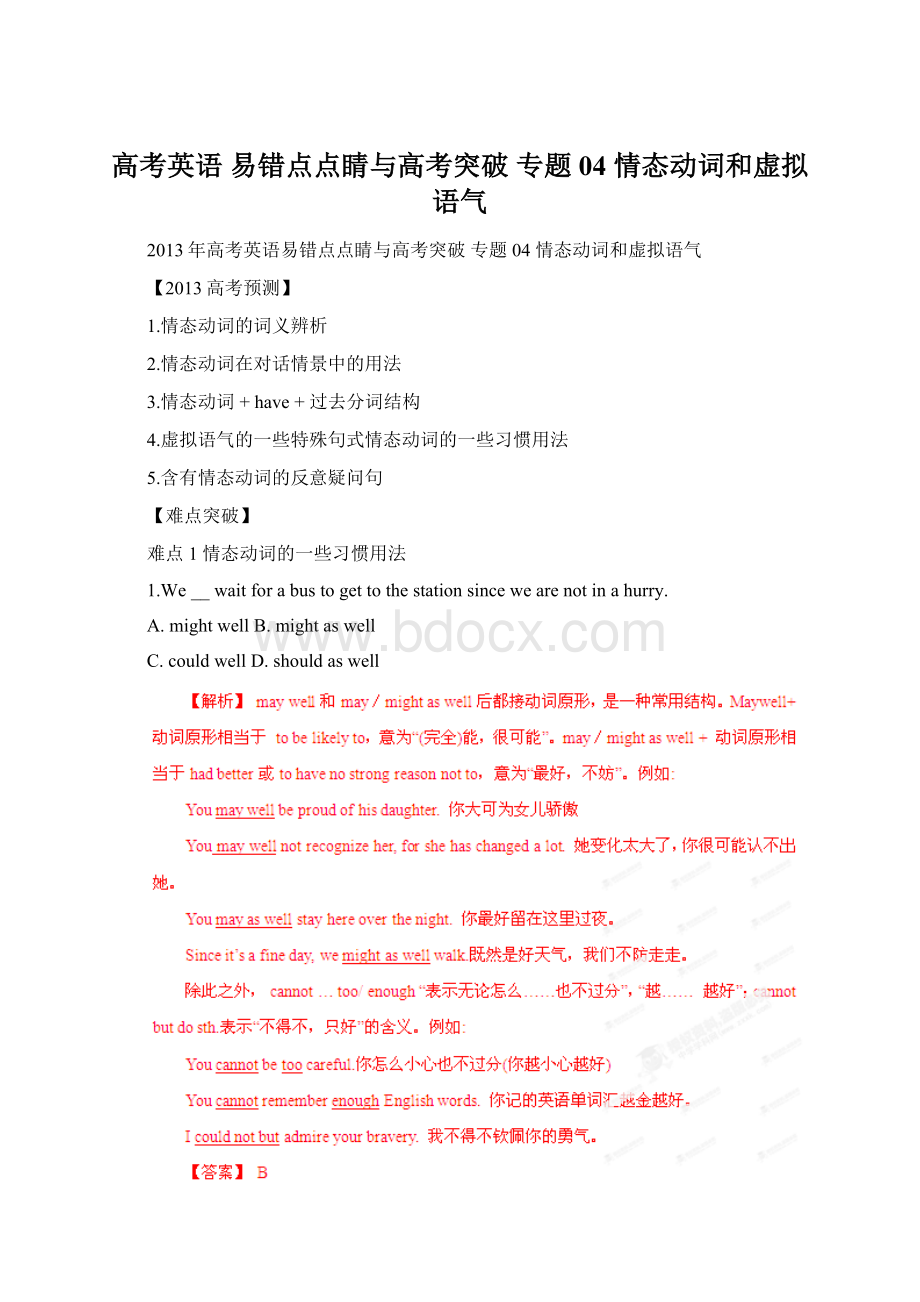 高考英语 易错点点睛与高考突破 专题04 情态动词和虚拟语气Word下载.docx
高考英语 易错点点睛与高考突破 专题04 情态动词和虚拟语气Word下载.docx
- 文档编号:18827384
- 上传时间:2023-01-01
- 格式:DOCX
- 页数:23
- 大小:668.27KB
高考英语 易错点点睛与高考突破 专题04 情态动词和虚拟语气Word下载.docx
《高考英语 易错点点睛与高考突破 专题04 情态动词和虚拟语气Word下载.docx》由会员分享,可在线阅读,更多相关《高考英语 易错点点睛与高考突破 专题04 情态动词和虚拟语气Word下载.docx(23页珍藏版)》请在冰豆网上搜索。

1Hemustbeintheclassroom,__
A.mustn’tB.can’tC.isn’tD.can
答案:
C
解析:
表示推测时,must的反意疑问部分根据谓语动词来确定。
2Thereusedtobeahightowerhere,?
A.wasthereB.wasn’tthereC.usedthereD.usedn’tthere
D
见usedto的用法。
3—look!
Bobiscarefullyexaminetheelectriclines.
A.Heshouldbetoocareful
B.Hemustbetoocareful
C.Hecannotbetoocareful
D.Hecanbetoocareful
2.Ioftenseelightsinthatemptyhouse.DoyouthinkI__reportittothepolice’?
.
A.shouldB.mayC.willD.can
【错误解答】D
【易错点点睛】本题的解题思路要从情态动词本身的意义和用法开始。
按照情景,在空房子里看到灯光,是一件奇怪而令人生疑的事,所以会问:
你是否认为我应当把这事情报告给警察?
强调“应该
”,所以用should.
【正确解答】A
3.I__payTracyavisit,butI’mnotsurewhetherIwillhavetimethisSunday.
A.shouldB.mightC.wouldD.could
【错误解答】B
【易错点点睛】从后文看,本周不一定有时间去看Tracy,是表示推测。
如果把mishtbe的猜测弄混淆了,就会误选B.should可以表示“对可能发生事情的推测”。
4.“Theinterest__bedividedintofiveparts,accordingtotheagreementmadebybothsides,”declaredthejudge.
A.mayB.shouldC.mustD.shall
5.John,lookatthetime.__youpianothepiahoatsuchalatehour?
A.MustB.CanC.MayD.Need
情态动词的基本用法
I.can(could)
1.表示体力或脑力方面的能力,或根据客观规定律能做某事的能力,意思是“能够”。
can表“能够”时,既可指将来,也可指现在。
beableto在表示能力时与can同义,但可用:
于各种时态,强调通过努力克服困难成功地做某事,相当managedtodo或succeededindoing.例如:
Noonecan(isableto)finishsuchadifficultthing.
HecanspeakEnglish.
Icangotherenow.
Withthehelpofthefiremen,thethetrappedpeopelwasabletoleavetheburningbuildung(不能用could)
2.表示许可、允许,在疑问句中表示“请求,许可”,否定句中表示“不许”,此时可与may通采用,有时cannot可以表示“禁止”,相当于“mustn’t”,例如:
May(Can)Ihelpyou?
Thatsortofthingcan’tgoon!
Youcan’t(mustn’t,arenotallowedto)playcomputergamesagain.
3.表示推测,强调客观可能性“可能、会”,can多用于疑问句和否定句,表示猜测时,情态动词后可用进行式或完成式。
—Therecomesaman.Whocanitbe?
—ItmustbeourEnglishteacher.
—No,itcan’tbehim.HehasgonetoAmerica!
He
can’thavegonetherealone.
4.could表示“能力”“可能性”“许可”,为can的过去式。
一般用于委婉、客气地提出问题或陈述看法,此时can,could并没有时间上的差别,只是could的语气更客气些。
回答时用原形回答。
—CouldIborrowyourEnglishdictionary?
—Ofcourseyoucan.Goahead.
Ⅱ.may,might(might为may的过去式)
1.表示许可,有“可以”的意思,询问或说的一件事可不可以做,有时可以用can互换。
其否定式maynot表示“不可以、禁止、阻止”等,常用mustnot=mustn’t代替,may用于疑问句中,回答这种问题时,多避免用may,而用其他形式,以免显得口气太严峻或不客气。
—Mum,mayIgotothecinematonight?
—Yes,youmay.(No,youmustn’t/you’dbetternot.)比较:
—Yes,please/pleasedon’t.
2.表推测、或许、可能的意思,表示一件事或许会发生,只用在陈述包中。
Herparentsmaycometoseehertomorrow.
3.may句式用来表示祝愿。
Mayyousucceed!
=Ihopeyoumaysucceed.
Mayyoubehappy,healthyandwealthy!
4.might是may的过去式,表示可以做的事或可能发生的事;
主句谓语动词是过去时态时用might不用may。
might一般用于比may的口气委婉,或表示现实的可能性更小一些的语境中.
OurteachersuggestedafewbookswhichImightbuy.
IwonderifImightbuysomesugarnow.
1.表示必须要做的事,意为“必须”,否定式mustn’t表示“不应该,不许可,禁止”等。
因此,在回答带有must的问句时,不用mustn’t,而用needn’t或don’haveto.例如:
—MustIhandinthepapernow?
——Yes,youmust.
—No,youneedn’t./youdon’thaveto.
2.用于一、三人称的疑问句中,表示说话人征求对方的意见和向对方请示。
Shallwebeginourclass?
Whenshallmyfatherbeabletoleavehospital?
V.should和oughtto
should表示劝告、建议常作“应当”讲,与oughtto有时可互换,oughtto更注重一些责任义务。
should表示预测可能性,并译作“可能,(按道理)应该”;
而oughtto则表示非常可能。
Should用于委婉、谦逊地提出意见或建议,oushtto可表示因责任、义务等该做的事。
Weshould(oughtto)helpeachotherinwork.(oughtto的语气要强)
Theyshouldcomeherenow.(按道理应该到了)
Iamyourteacher,Ioughttohelpwithyourstudy.(表示有这个责任)
Ⅵ.will和would
will可以表示意愿、意志和决心,适用于各种人称。
可以用来表示各种倾向或习惯动作。
有时还用来表示“难免”。
其过去式是would,也可以是单独的情态动词,在表示委婉提出请求、建议或看法时,语气比will委婉,肯定的回答时用will。
Don’tworry.Hewilldohisbest.
Wherethereisawill,therewillbeasuccess.(表示习惯)
Accidentwillhappen.(难免)
Wouldyoupleasedomeafavor?
1Coffeebedrunkwhileitishot.
A.shallB.mustC.willD.oughtto
这里oughtto表示“劝告或推荐”。
2Tellhimthathehavethebooktomorrowafternoon
A.shallB.willC.needD.dare
A
从句意判断,表示了“我”的承诺。
Shall用于第二、三人称表示“允诺、命令、警告”的含义。
3Ilivedwithmy
unclethissummerandIdidn’thavetopayrent.SoI__savemostofmysalary.
A.couldB.wouldC.wasable’toD.should
Wasableto表示“能够做什么而且已经做成”。
易错点点睛2情态动词对话情景中的用法
1.—Lucydoesn’tmindlendingyouherdictionary.
—She.I’vealreadyborrowedone.
A.musn’tB.maynotC.can’tD.needn’t
3.—Whoisthegirlstandingoverthere?
—Well.Ifyou__know,hernameisMobile.
A.mayB.canC.mustD.shall
【易错点点睛】may表示“可以”,can表示“能够”,shall表示“应该”,must表示“必须,一定”,从句意来看:
如果你一定要知道的话,(我就告诉你吧)她的名字是Mobile.那么只有must符合了。
【正确解答】C
4.—Excuseme,butIwanttouseyourcomputertotypeareport.
—You__havemycomputerifyoudon’ttakecareofit.
A.can’tB.mightnotC.needn’tD.shouldn’t
【特别提醒】
情态动词中三组表达方式的用法区别
1.would与usedto的区别。
在表示过去重复的习惯时,usedto可用Would代替。
usedto强调过去的行为同现在的对比,含有“过去怎样,而现在却不这样了”的含义;
而Would则单纯表示过去的习惯动作,常与often,everyday连用,当只是表示过去的状态时,只能用usedto.
Theywouldhaveadrindinthebaratnoon.
Thyusedtohaveadrinkinthebaratnoon.(现在右能不了)
Chinaisnotwhatitusedtobe.(表示对比,不能用would)
Everyevening,shewouldsitinfrntofthedoortowaitforherson.(表示过去的习惯动作,不能用usedto)
Theyusedtobeatempleonthetoofthemountain.(表示过去的状态,不能用would)
2.表示“宁愿做某事”时,有下列句式结构:
wouldratherdosomething
woulddosth.ratherthandosth.
Wouldrathersb.didsth.
prefertodosth.
Prefertodosth.Ratherthandosth.
prefertodosth.todoingsth.
3.情态动词否定式所表达的含义
maynot,mightnot或许不,可能不
can’tcannot(=benotableto)不能说
can’t,cannot不可能
maynot,can’t,cannot,mustn’t(=benotallowedto)不许可
need’t(=don’thaveto)不必
shouldn’t,oughtn’tto(=benotsupposedto)不应该
1—CanItellmybestfriendaboutit7
—No,Idon’twantanyoneelsetoknowit.You__keepittoyourself.
A.canB.needC.mustD.may
3—Mum,whyareyouhere?
—I’vebroughtyourcamera.Ithoughtyou__useit.
A.canB.shouldC.mightD.will
B.mightgothrough
C.oughttohavegonethrough
D.musthavezonethrough
3.—IstayedatahotelwhileinNewYork.
—Oh,didyou?
YouwithBarbara.
A.couldhavestayedB.couldstay
C.wouldstayD.musthavestayed
4.Oh,I’mnotfeelingwellinthestomach.I__somuchfriedchickenjustnow.
A.shouldn’tea
tB.mustn’thaveeaten
C.shouldn’thaveeatenD.mustn’teat
【易错点点睛】justnow是表示过去的时间状语。
情态动词在表示过去发生的事时,必须用“情态动词+have+过去分词”结构。
所以只能在选项B或C中来确定答案。
Mustn’thaveeaten是一个错误选项,因为mustn’t+动词表示“禁止”,不表示判断或推测。
全句意为:
噢,我觉秘胃不舒服。
我刚才不应该吃那么多炸鸡。
5.—DoyouknowwhereDavidis?
Icouldn’tfindhimanywhere.
—Well.Hehavegonefar-hiscoatisstillhere.
A.shouldn’tB.mustn’tC.can’tD.wouldn’t
小结:
“情态动词+过去分词”用法
1.musthavedone表示对过去已经发生的行为进行推测,意思是“想必、准是、一定做了某事”。
Itmusthaverainedlastnight,forthegroundwasquitemuddy.
Theligh
tswereout.Theymusthavebeenasleep.
2.may/mighthavedone表示对过去已经发生行为韵推测;
意思是“也许;
或许、已经(没有)…”。
一般只用于肯定句或否定句中,不用于疑问句。
用might表示语气更加不肯定。
It’stoolate.Ithinkhemayhavegonetobed.
Hemaynothavefinishedthework.Shemighthavecaughtacold.
3.mighthavedone表示“本来可能;
…”,但实际上没有发生的事情。
还可以表示“本来应该或可以做某事”的意思;
有轻微的责备语气。
Youshouldnothaveswuminthatriver.Youmighthavebeeneatenbyfish.
Youmighthavegivenhimmorehelp,thoughyouwerebusy.
4.could
havedone用于肯定句中,表示“可能已经……”的意义,也可以表示过去没有实现的可能性,意思为“本来可以……”。
Youcouldhavedonebetter,butyouweretoocareless.
IwenttoNewYorklastsummerandstayedatahotel,butIcouldhavestayedwithmybrother.
Isawhisfatherjustnow.Hecouldn’thavegonetoShanghai.
5.should/ougttohavedone用于肯定句时,表示本该做某事,但实际上没做;
用于否定句时,则表示不该做的事反而做了。
Youshould/oughttohavecometothemeetingearlier.
Heoughtnottohavetreatedhisparentslikethat.
6.needn’thavedone表示本来不必去做的事但做了。
但是didn’tneedto表示”没有必要做而实际上也没有做”。
Youneedn’thavetakenataxihere,foritwa
sveryneartomyhouse.
Ididn’tneedtocleantheroom.Mymotherdidit.
7.can…havedone和cannothavedone表示对过去发生的行为的怀疑和不肯定。
Hecannothavetakenawaythemagazine.
Canhehavegonehome?
1—DidMarycometotheparty?
—Idon’tknow.ShewhileIwasout
A.mayhavecomeB.musthavecome
C.mightcomeD.couldcome
易错点点睛4虚拟语气的一些特殊句式
1.IfI____plantodoanythingIwantedtodo,I’dliketogoTibetandtravelthroughasmuchofifaspossible.
A.wouldB.couldC.hadtoD.oughtto
【错误解答】A
【易错点点睛】受if条件虚拟语气的影响,会误选A,根据句意,如果“能够的话”,当用could更符合语境。
【正确解答】B
2.Youdidn’tletmedrive.Ifwe__turn,yousotired.
A.drove;
didn’tgetB.drove;
wouldn’tget
C.weredriving;
wouldn’tgetD.haddriven;
wonldn’thavegot
4.Iwouldlove__tothepartylastnight,butIhadtoworkextrahours
tofinishareport.
A.togoB.tohavegone
C.goingD.havinggone
虚拟语气中的几种特殊情况
1.if省略句
在条件句中,可省略if把were,had,should提到句首,变为倒装句式。
如果谓语动词是否定形式时,不能用动词的缩略形式。
Shouldit(Ifitshould)raintomorrow;
wewouldnotgofishing.
Wereitnot(ifitwerenot)theexpense,Iwouldgoabroadnow.(不能用weren’t)
2.在wouldrather后的宾语从句中的虚拟语气形式用动词的过去式,在Itis(hish)time(that)…句型
- 配套讲稿:
如PPT文件的首页显示word图标,表示该PPT已包含配套word讲稿。双击word图标可打开word文档。
- 特殊限制:
部分文档作品中含有的国旗、国徽等图片,仅作为作品整体效果示例展示,禁止商用。设计者仅对作品中独创性部分享有著作权。
- 关 键 词:
- 高考英语 易错点点睛与高考突破 专题04 情态动词和虚拟语气 高考 英语 易错点 点睛 突破 专题 04 情态 动词 虚拟 语气
 冰豆网所有资源均是用户自行上传分享,仅供网友学习交流,未经上传用户书面授权,请勿作他用。
冰豆网所有资源均是用户自行上传分享,仅供网友学习交流,未经上传用户书面授权,请勿作他用。


 对中国城市家庭的教育投资行为的理论和实证研究.docx
对中国城市家庭的教育投资行为的理论和实证研究.docx
